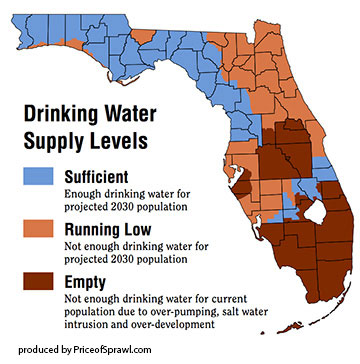Florida's Population Paradox
By Jerry Karnas, Miami Herald, Jan. 7, 2013

Explaining why 600 people a day moved to the Sunshine State, the late Florida Senate President Jim King used to say, “Florida is the land of milk and honey.”
The axiom still applies: In December the U.S. Census Bureau confirmed that more people move to Florida every year than to any other state. Over the course of the state’s history, its population has doubled every 20 years. Today there are more than 19 million Floridians.
Gov. Rick Scott recently touted this population growth as evidence that our economy is on the mend. It’s true that the state’s economy is predicated on growth, but that growth comes at a steep price. While we squeeze more people into Florida, we’re squeezing out wildlife, wild places, wetlands, fresh water sources and indeed our own quality of life. That’s the paradox of Florida: The very qualities that attract newcomers are continuously undermined and degraded by our attempt to accommodate them.
There’s nothing new about this paradox. What’s different is the scale and the timing: Over the past 50 years the state has grown faster and more furiously than ever before. We’re paying for that in sacrificed panthers, manatees and other wild creatures, as well as in springs that are drying up just as the state’s beset by climate change and rising sea levels. We’re at a crucial moment that demands careful governance.
In his seminal book The Swamp, author Michael Grunwald recounted a meeting early in Gov. Bob Graham’s first term, in 1981, when the governor was shown a Sports Illustrated swimsuit issue -- which featured not only Christie Brinkley photographed on Captiva Island but also an article called Trouble in Paradise that said the state was “going down the tubes” because of out-of-control growth. The piece shook Graham to the core. He hadn’t run for governor as an environmentalist; but eventually he dedicated a large portion of his governorship to the state’s environmental woes. In the end his leadership left Florida better prepared for future growth.
Most of our subsequent governors have shared, albeit to varying degrees, Graham’s understanding that a balance between growth and environmental protection is needed. That’s not to say they were all paragons of environmental stewardship across the board; but a trajectory toward better management was visible.
Unfortunately, Gov. Scott has taken a radically different approach.
- His response to the housing crisis? Gut Florida’s growth-management laws.
- His response to the climate crisis? Deny that it exists, support oil drilling off Florida’s beaches and kill the state’s nascent renewable-energy industry for which his predecessor fought.
- His response to red tides, algal blooms and fish kills in Florida’s lakes, rivers and estuaries? Challenge the federal government’s efforts to enforce the Clean Water Act.
- His response to West Palm Beach coming within 20 days of running out of drinking water? Cut the budgets of the state’s water-management districts.
- His response to record panther deaths, degradation of our springs, and droughts threatening our water supply? Defund Forever Florida, the state’s land-buying program.
If we’re going to leave Florida better than we found it -- a modest enough goal, if you ask me -- then we need to start connecting the dots between population, growth, development and the loss of the wildlife and wild places that makes Florida such an incredible piece of paradise. That’s true at a larger scale too: The world’s population hit 7 billion people last year just as we’re in the midst of an extinction crisis for species around the globe hit by a triple whammy of habitat loss, human encroachment and climate change.
We’re overdue to address population, consumption and unsustainable growth, here in Florida and beyond. We can do it through a variety of solutions, from the personal -- better family planning, access to reproductive health and consumer choices that reduce our environmental footprint -- to the political, including smarter growth and policies that emphasize preservation of clean water, air, wildlife habitat and a healthy climate. Three years ago Florida was building record-breaking solar power plants, promising to power future growth with clean energy. We urgently need to get back to work on that.
It’s not too late to save a Florida that still has panthers, manatees, plentiful fish, open space and glorious coral reefs, but we need to act now. Future generations of travelers arriving at Florida’s door -- still enticed, we hope, by its “milk and honey”-- will thank us.
-- Reprinted by permission of Miami-based Jerry Karnas, the population campaign director for the Center for Biological Diversity.
Got Water? Price of Sprawl - Note: Visit Florida estimated Florida had 91.4 million visitors in 2012. They spent $71.8 billion on related tourism.
